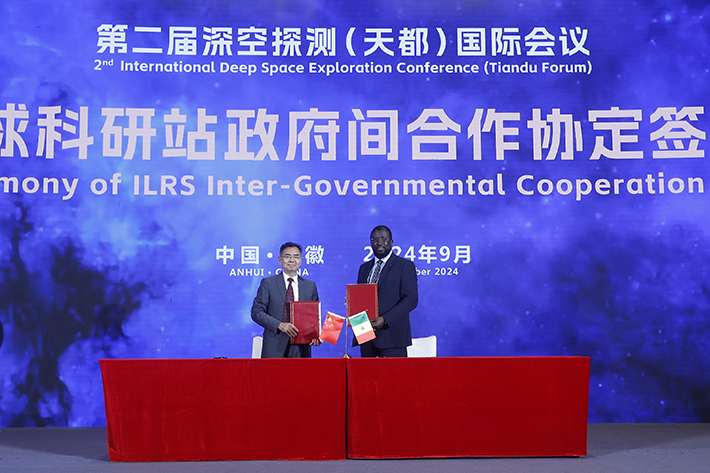|
||||||||||
| Home Top News Economy/Tech Culture/Sports China in Foreign Eyes Green Development Videos Intangible Cultural Heritages |
|
||||||||||
| Home Top News Economy/Tech Culture/Sports China in Foreign Eyes Green Development Videos Intangible Cultural Heritages |
| ChinAfrica |
| Lion Eyes the Stars |
| Senegal joins Chinese lunar station programme, affirming its space ambitions |
| By ALY DIOUF | VOL. 17 November 2025 ·2025-11-05 |

Li Guoping and Maram Kairé sign the agreement formalising Senegal’s accession to the International Lunar Research Station in Huangshan, Anhui Province, China, on 5 September 2024 (XINHUA)
Space was once a distant dream for African nations like Senegal. But that is changing fast. Today, space is emerging as a strategic frontier for the continent, with 22 countries including Senegal now operating national space agencies. Senegal launched its own agency, the Senegalese Space Study Agency (ASES), in March 2023.
The recent inauguration of the African Space Agency’s headquarters in Cairo, Egypt, marks a new chapter in Africa’s rising ambitions beyond Earth. Tasked with coordinating national programmes, the agency seeks to drive economic and social development through space technologies while promoting scientific cooperation both within Africa and internationally.
Senegal, for its part, has steadily expanded its capabilities in remote sensing, geomatics, crop and soil monitoring, and astronomy. In 2024, it launched its first satellite. Just months later, it signed a landmark agreement with China to join the International Lunar Research Station (ILRS). Scheduled to begin operations by 2035, the ILRS represents a major step forward in Senegal’s journey into space.
Aiming for Moon
Senegal formalised its participation in the ILRS on 5 September 2024 by signing a cooperation agreement with China, through the ASES and the China National Space Administration (CNSA). The agreement was signed during the second International Deep Space Exploration Conference, held in Huangshan, Anhui Province. The event brought together more than 400 experts from around the world and focused on the ILRS project.
China plans to establish a robotic base on Moon by 2035, executing five consecutive launches to build energy, communication and core infrastructure systems. The initial missions are scheduled to begin in 2028, with an expanded station capable of supporting human crews anticipated by 2045. Senegal’s cooperation with China follows just one year after the establishment of its space agency the ASES, and the launch of its first nano satellite, underscoring the country’s rising ambition to become a significant player in the global space industry.
“In the medium and long term, this collaboration will enable us to strengthen human resources, develop infrastructure, and benefit from technology transfer for future generations,” said Maram Kairé, director general of the ASES, during the signing of a memorandum of understanding with Li Guoping, chief engineer of the CNSA. “The space sector will contribute to national development by delivering products and services that benefit both the state and the public. It will also play a strategic role in advancing our country’s technological capacity,” he added. The agreement also provides for the training of Senegalese scientists and engineers to participate in lunar missions, enhancing their expertise and facilitating integration into international research networks.
Shared orbits
Sino-Senegalese cooperation in the space sector reflects a broader vision to harness space as a catalyst for sustainable development, bringing economic, social, and environmental benefits. Lunar exploration, in particular, offers potential solutions to global challenges such as resource management, environmental monitoring, and applied research.
This partnership is part of the wider momentum driven by the Forum on China-Africa Cooperation and the Belt and Road Initiative, through which China is expanding technological collaboration with African nations. Just days before the agreement was signed, Senegalese President Bassirou Diomaye Faye met with Chinese President Xi Jinping in Beijing, reaffirming their shared commitment to making space a strategic pillar of bilateral cooperation and sustainable growth.
Within this framework, China has deepened space partnerships across the continent, advancing efforts in disaster prevention, environmental protection, and economic development. Senegal is the latest country to join this growing initiative, following in the footsteps of Egypt and South Africa. The launch of China-Africa Cooperation Centre on Satellite Remote Sensing Application in 2023 further underscores China’s commitment to space collaboration, data sharing, creation of joint public goods, and environmental monitoring across Africa.
Gaindé in orbit
On 16 August 2024, Senegal entered a new era of scientific ambition with the successful launch of Gaindesat-1A, its first nano satellite. The name - a fusion of Gaindé (meaning lion, the national totem) and satellite - reflects the country’s determination to stake its claim in the space age.
Designed by Senegalese engineers in partnership with the Space Centre at the University of Montpellier, the 1-kg CubeSat is built to collect environmental data and capture satellite imagery over Senegal.
Gaindesat-1A marks the first achievement of the SenSat national space programme, launched in 2019 under the leadership of Gayane Faye. Thirteen Senegalese engineers and technicians, trained in Montpellier, were involved in every stage of the satellite’s development. The wider objective is to foster a sustainable space ecosystem - building local expertise, developing data infrastructure, and creating high-skilled jobs.
Equipped to capture meteorological and hydrological data, the satellite will aid in climate risk monitoring, agricultural planning, and water resource management. It will also contribute to national security and strategic intelligence. A dedicated control centre in Diamniadio has been established to manage its operations and analyse the data it transmits.
With this launch, Senegal becomes the 12th African nation to place a satellite in orbit - affirming its place in the continent’s growing space movement. President Faye hailed the event as “a major step towards technological sovereignty,” and a clear sign of Senegal’s commitment to innovation.
| About Us | Contact Us | Advertise with Us | Subscribe |
| Copyright Beijing Review All rights reserved 京ICP备08005356号-5 京公网安备110102005860号 |